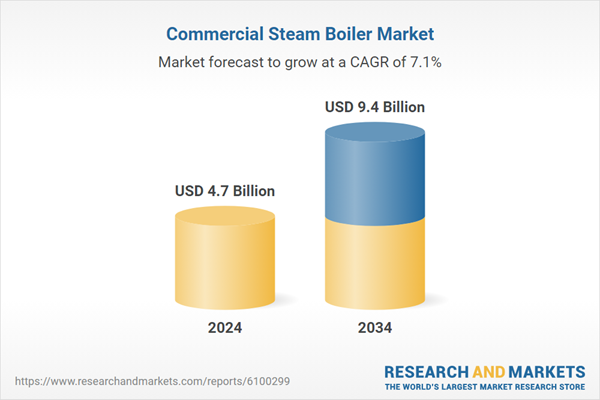Moreover, the integration of smart technologies such as IoT monitoring systems into commercial steam boilers is improving operational visibility and enhancing energy optimization. These advancements are enabling users to better manage performance, reduce energy waste, and improve uptime, key factors in maintaining continuity in mission-critical environments. Increasing pressure from regulatory agencies for cleaner emissions is also influencing buyer preferences. Compliance with stringent energy standards such as those set by ASME and EN is encouraging the replacement of outdated models with next-generation high-efficiency boilers.
Incentives provided by government bodies for upgrading heating systems in public infrastructure are further accelerating the pace of adoption. Modernization projects focused on schools, medical centers, and government buildings are facilitating broader deployment of efficient steam boiler systems. With increased awareness about the benefits of modular boiler solutions, more commercial users are adopting scalable units that are easier to install and maintain. These modular configurations are designed to handle fluctuating heating loads efficiently and can be serviced without causing operational disruptions - making them ideal for facilities that demand constant uptime.
The market is segmented by fuel type into natural gas, oil, coal, electric, and others. Natural gas continues to be the most widely adopted fuel due to its reduced environmental footprint, superior energy performance, and relatively lower operational expenses. The natural gas segment alone is projected to surpass USD 4 billion in market value by 2034. The rapid expansion of gas pipeline infrastructure and increasing access to liquefied natural gas (LNG) are contributing factors that enhance the viability of gas-powered steam boilers in commercial spaces. These systems offer superior thermal efficiency and flexibility in operations, making them a popular choice for a variety of building types.
When assessed by application, the market includes commercial establishments such as healthcare facilities, office spaces, lodging, retail environments, educational buildings, and others. Healthcare-related usage held a 26.6% share of the market in 2024, driven by continuous developments in medical infrastructure. The demand for reliable steam-based applications, including sterilization, space heating, and daily operations, is fueling installations in clinics, diagnostic labs, and hospitals.
In the United States, the commercial steam boiler market experienced steady growth, reaching USD 816.1 million in 2024, up from USD 727.4 million in 2022 and USD 771.9 million in 2023. This growth trend reflects strong national policies focused on clean energy initiatives and increased investments in commercial development. Demand is further supported by evolving regulatory requirements aimed at reducing emissions through the adoption of low-NOx burners and more advanced combustion methods.
Across North America, the commercial steam boiler market is forecast to grow at a CAGR of over 6.5% through 2034. Continuous development in healthcare-related infrastructure, in combination with government-driven efforts to expand and modernize commercial buildings, is shaping a favorable landscape for steam boiler adoption. Supportive policy frameworks and regulatory clarity are expected to contribute to long-term industry growth.
Key participants in the commercial steam boiler market include Smith Hughes Company, Fulton, LAARS Heating Systems, Cleaver-Brooks, York-Shipley, Lochinvar, Clayton Industries, Bosch Industriekessel, Precision Boilers, Babcock & Wilcox, Sellers Manufacturing, Hoval, Burnham Commercial, WM Technologies, Columbia Heating Products, Superior Boiler, Vapor Power International, FERROLI, VIESSMANN, and PARKER BOILER. These companies are focusing on innovation, energy efficiency, and product reliability to maintain their competitive edge and meet evolving customer demands across commercial sectors.
Comprehensive Market Analysis and Forecast
- Industry trends, key growth drivers, challenges, future opportunities, and regulatory landscape
- Competitive landscape with Porter’s Five Forces and PESTEL analysis
- Market size, segmentation, and regional forecasts
- In-depth company profiles, business strategies, financial insights, and SWOT analysis
This product will be delivered within 2-4 business days.
Table of Contents
Companies Mentioned
The companies featured in this Commercial Steam Boiler market report include:- Babcock & Wilcox
- Bosch Industriekessel
- Burnham Commercial
- Clayton Industries
- Cleaver-Brooks
- Columbia Heating Products
- FERROLI
- Fulton
- Hoval
- LAARS Heating Systems
- Lochinvar
- PARKER BOILER
- Precision Boilers
- Sellers Manufacturing
- Smith Hughes Company
- Superior Boiler
- Vapor Power International
- VIESSMANN
- WM Technologies
- York-Shipley
Table Information
| Report Attribute | Details |
|---|---|
| No. of Pages | 125 |
| Published | May 2025 |
| Forecast Period | 2024 - 2034 |
| Estimated Market Value ( USD | $ 4.7 Billion |
| Forecasted Market Value ( USD | $ 9.4 Billion |
| Compound Annual Growth Rate | 7.1% |
| Regions Covered | Global |
| No. of Companies Mentioned | 21 |









